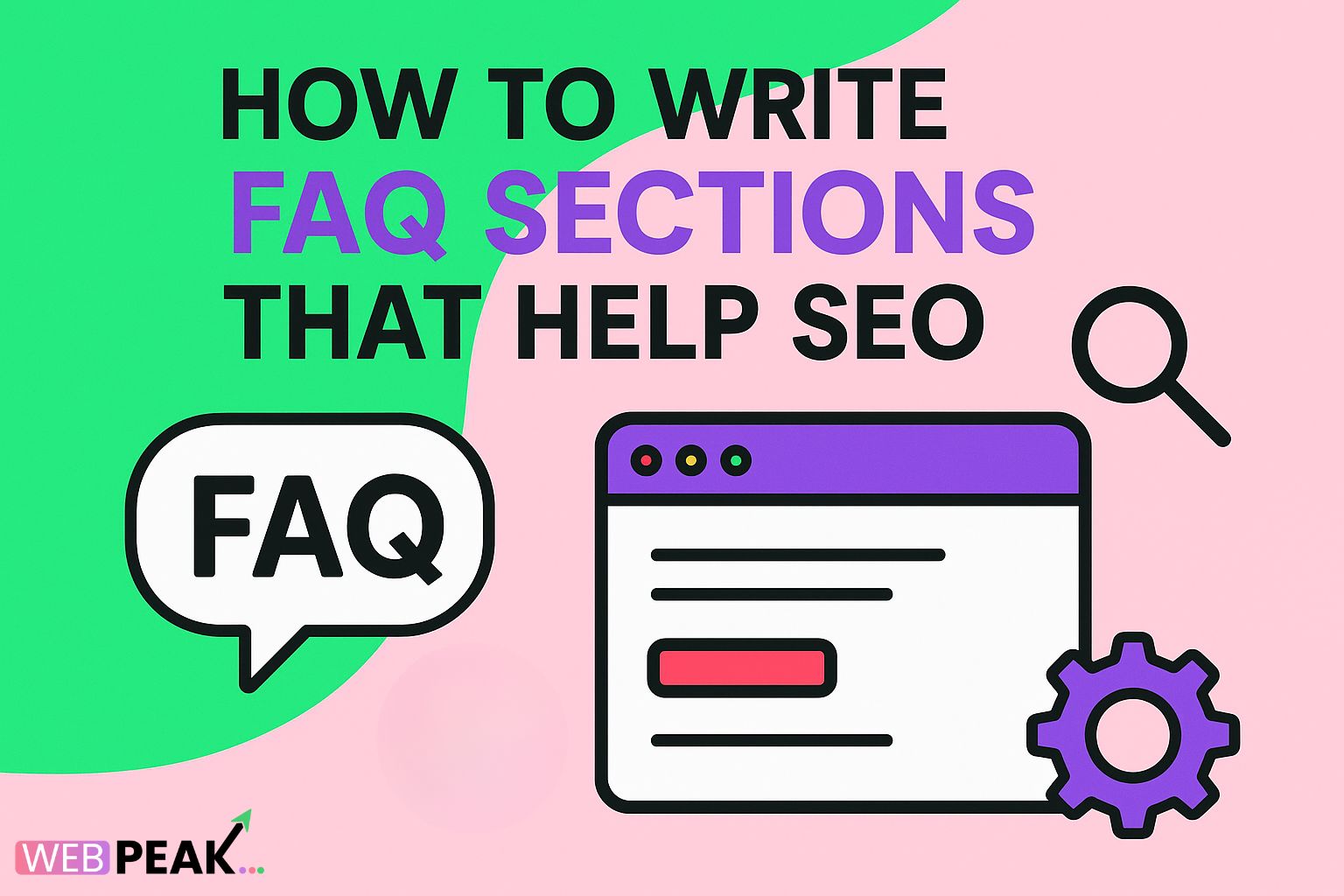How to Write FAQ Sections That Help SEO
Adding an FAQ (Frequently Asked Questions) section to your website can significantly boost your organic visibility and user engagement. When written strategically, FAQ sections can help your content appear in featured snippets, improve internal linking, and address user intent — all of which contribute to stronger SEO performance. In this guide, we’ll explore how to write FAQ sections that help SEO, covering practical steps, structure tips, and optimization techniques you can apply to your own website.
Why FAQ Sections Are Important for SEO
FAQ sections serve two primary purposes: enhancing user experience and improving search engine rankings. Search engines like Google prioritize pages that answer user questions clearly and concisely. Well-crafted FAQs provide immediate answers, increase dwell time, and reduce bounce rates — key indicators of content quality.
Moreover, FAQ sections can appear directly in search results through rich snippets, giving your website more visibility. This can significantly improve click-through rates (CTR) and drive more qualified traffic to your pages.
SEO Benefits of an Optimized FAQ Section
- Improved Visibility: FAQ schema helps your questions and answers show up as rich results on Google.
- Better User Experience: FAQs guide visitors to quick, relevant answers.
- Increased Keyword Coverage: You can target long-tail and conversational keywords naturally.
- Enhanced Internal Linking: FAQs can link to related pages and improve site structure.
- Reduced Bounce Rates: When users find what they need quickly, they stay longer on your site.
Step-by-Step Guide: How to Write FAQ Sections That Help SEO
Creating an FAQ section that actually boosts your SEO isn’t just about listing random questions and answers. It’s about understanding search intent, organizing content logically, and applying SEO best practices. Below is a step-by-step process for writing high-performing FAQ content.
1. Identify the Right Questions to Include
The first step is research. You need to identify what users are asking related to your topic, product, or service. Use the following sources to find the best FAQ topics:
- Google’s “People Also Ask” Box: Enter your main keyword and note the recurring questions.
- AnswerThePublic: Visualize commonly searched queries in your niche.
- Reddit and Quora: Explore forums to see real-world user concerns.
- Customer Service Data: Analyze support tickets, emails, or chat logs.
- Competitor Sites: Review competitor FAQs for inspiration and gaps you can fill.
Prioritize questions that align with your target keywords and address pain points your audience actually faces.
2. Optimize Each Question with Search Intent in Mind
Every FAQ question should reflect how people actually search online. This means writing in natural, conversational language while including relevant keywords. For instance, instead of writing “Benefits of FAQ schema,” use “What are the benefits of FAQ schema for SEO?”
Focus on the intent behind each query — whether it’s informational, navigational, or transactional. Aligning with intent ensures that your FAQs are both search-friendly and user-relevant.
3. Write Clear, Concise, and Helpful Answers
Each answer should be direct and value-driven. Keep your responses between 40–80 words when possible, as shorter answers perform better in featured snippets. Here’s how to optimize answers:
- Answer the question immediately: Start your response with a direct answer before elaborating.
- Include related keywords: Use variations of your target keyword naturally.
- Add supporting details: Use examples, statistics, or references when appropriate.
- Use structured formatting: Bullet points or numbered lists can enhance readability.
4. Use Proper HTML Structure for SEO
Google relies on clean code to understand your content hierarchy. Use heading tags correctly:
- Wrap each question in an
<h3>or<h4>tag. - Wrap each answer in a
<p>tag or list format. - Group your FAQ section under a main
<h2>heading for clarity.
This helps search engines index your FAQs properly and improves accessibility for screen readers.
5. Implement FAQ Schema Markup
Schema markup is essential for making your FAQ content eligible for rich results. It helps Google display your questions and answers directly in the SERPs. To add schema, wrap each question-answer pair in JSON-LD format. Here’s an example:
<script type="application/ld+json">
{
"@context": "https://schema.org",
"@type": "FAQPage",
"mainEntity": [{
"@type": "Question",
"name": "How does an FAQ section help SEO?",
"acceptedAnswer": {
"@type": "Answer",
"text": "FAQ sections help SEO by providing structured answers to common queries, improving user engagement and increasing chances of appearing in Google rich results."
}
}]
}
</script>
Adding FAQ schema can increase your search visibility and CTR without changing your content layout.
6. Incorporate Internal Links for SEO Value
Whenever possible, link from your FAQ answers to relevant internal pages. This strengthens your site’s internal linking structure and helps distribute link equity. For example:
“You can learn more about optimizing your website speed in our Website Performance Guide.”
These contextual links guide users deeper into your site and signal content relationships to search engines.
7. Keep Your FAQs Updated
SEO is dynamic, and user questions evolve over time. Regularly audit and update your FAQ content every 3–6 months. Monitor analytics data to identify which questions drive the most engagement or impressions, and refine others as needed.
Actionable SEO Checklist for Writing FAQ Sections
- Research questions using keyword tools and “People Also Ask.”
- Write questions using natural language with target keywords.
- Provide concise, accurate, and user-friendly answers.
- Use proper heading hierarchy (
<h2>,<h3>, etc.). - Add FAQ schema markup for enhanced visibility.
- Include relevant internal links to related pages.
- Ensure mobile-friendly and fast-loading FAQ pages.
- Update regularly to maintain SEO freshness.
Common Mistakes to Avoid When Writing FAQs
Even with the best intentions, many businesses make mistakes that limit the SEO potential of their FAQ sections. Avoid these pitfalls:
- Using overly generic questions: Be specific and relevant to your audience.
- Keyword stuffing: Keep language natural — search engines can detect manipulation.
- Neglecting schema markup: Without it, you miss out on rich snippet opportunities.
- Ignoring formatting: Long, unstructured text reduces readability and engagement.
- Failing to update FAQs: Outdated answers hurt credibility and rankings.
Real-World Example of an SEO-Optimized FAQ Section
Let’s take an example from a digital marketing agency’s website. Their FAQ section includes targeted questions such as:
- “How long does SEO take to show results?”
- “What’s the difference between on-page and off-page SEO?”
- “How do you measure SEO success?”
Each answer is concise, keyword-rich, and linked to deeper service pages. With schema markup added, their FAQ content consistently earns positions in Google’s rich results — driving high-quality leads organically.
FAQ: How to Write FAQ Sections That Help SEO
What makes a good FAQ question for SEO?
A good SEO-friendly FAQ question reflects real search intent. It’s written in the same language users use in Google queries, typically in “what,” “how,” “why,” or “can” formats.
How long should FAQ answers be?
Keep FAQ answers concise — between 40 to 80 words is ideal. It should directly answer the question while including related keywords naturally.
Can I use FAQ schema on multiple pages?
Yes. You can add FAQ schema to multiple pages, as long as each page’s questions and answers are unique and relevant to the page’s content.
Should I include links in my FAQ answers?
Absolutely. Adding internal links helps users explore related pages and enhances SEO by strengthening your site’s linking structure.
Do FAQ sections still matter for SEO in 2025?
Yes, they do. FAQ sections remain a valuable on-page SEO tool, especially for voice search and rich snippet optimization. They help align content with user intent more effectively than ever.
Final Thoughts
Learning how to write FAQ sections that help SEO can transform your website’s visibility and user engagement. By focusing on real user intent, using structured markup, and keeping content fresh, you can turn a simple FAQ page into an SEO powerhouse.
Whether you’re managing a blog, eCommerce store, or service-based website, optimized FAQ sections can help your brand build authority and attract more qualified visitors. If you’re looking for expert guidance, WEBPEAK is a full-service digital marketing company offering professional Web Development, Digital Marketing, and SEO services to help you grow your online presence effectively.
Start optimizing your FAQ content today — and let your answers do the ranking!





